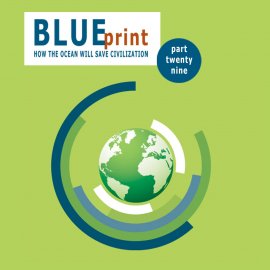The UN Environmental Accounting Framework: A Breaking Wave
-
English
-
ListenPause
[intro music] Welcome to World Ocean Radio… I’m Peter Neill, Director of the World Ocean Observatory. The ocean is an infinite oscillation of movement and volume that is interrupted by the hard edge of shore. We are drawn to places where those waves build and reveal, compress and loom, then form into a fluid crest that comes cascading down with tremendous sound and spray and impact, bearing witness to the power of natural force and dynamic change. Sometimes such breaking waves come in surprising form. Sometimes comparable force and change can be found in a quiet announcement, a policy shift with implication as powerful and dramatic as those physical waves alongshore. In March 2021, with a press release, the United Nations Department of Economic and Social Affairs announced “a new statistical framework linking economy and the environment that would go beyond Gross Domestic Product (GDP) to drive policy decisions.” “The adoption of a new accounting framework – the System of Environmental-Economic Accounting – would mark a major step forward to incorporating sustainable development in economic planning and policy decision-making and could have significant impact on efforts to address critical environmental emergencies, including climate change and biodiversity loss.” “The new framework would go beyond the commonly use statistic of gross domestic product and would ensure that natural capital – the contribution of forests, oceans, and other ecosystems – are recognized in economic reporting.” UN Secretary-General Antonio Guterres is quoted, “… we need to transform how we view and value nature. We must reflect nature’s true value in all our policies, plans, and economic systems. With a new consciousness, we can direct investment into policies and activities that protect and restore nature and the rewards will be immense.” “More than half of global GDP depends on nature,” the release continues, “but globally it is estimated that natural capital has declined 47% in just over two decades. It is estimated that human activity has severely altered 75% of the planet’s terrestrial, and 66% of its marine environment, leading to an average decrease of 47% against their natural baselines. And climate change continues its relentless march… And yet countries now spend some US $4 to 6 trillion on subsidies that damage the environment…The framework recognizes that ecosystems deliver important services that generate benefits for people. In essence, they are assets to be maintained, similar to economic assets.” Stilted bureaucratic announcement language that belies the efforts of hundreds of experts across a full range of disciplines with further hundreds reviewing, modifying, and endorsing through global consultation. This is what the United Nations does best, however slowly, to shape and enable change and best practice through process and compromise, diplomacy and consensus. Sometimes it seems so slow, like ice melting or rock eroding into sand. But sometimes it creates through subtle conversation a shift as startling as this affirmation of ecosystem service accounting as a mandatory consideration in future policies, its integrated application and requirement for future development on land and sea. Consistent listeners to World Ocean Radio will know that I have focused on this concept and belabored its argument and justification over many recent editions. I have tried to share what seems to me a destructive negative reality in how we analyze, value, subsidize, and promote a worldview and economic context that has enabled decades of bad decisions, irresponsible consumption of natural resources, inadequate financial controls, regulation, and accountability, and practices that have exhausted our resources, divided to extreme public versus private interest, and created inequities and injustices worldwide. I am certainly not alone in this belief, but it has always seemed like shouting into the wind, however many advocates like so many foolish idealists struggling, drowning, in a sea of overwhelming convention, self-serving, and anger. This quiet UN announcement is, in my opinion, the explosive sound of transformational change. Think of it: natural capital calculated as equal to financial capital, as mandatory inclusion in the budgets and estimates for all new development projects and corporate initiatives, in how we review and value goods and services, structures and behaviors, in how we act collectively to preserve this essential contribution to our global health and well-being. That is some serious noise. The ocean must be nearby. Listen. Do you hear it? The sound of climactic oscillation, the breaking wave of change. We will discuss these issues, and more, in future editions of World Ocean Radio. [outro music]
This week on World Ocean Radio: part twenty-nine of the multi-part BLUEprint series. In this episode we discuss the March 2021 release by the UN Department of Economic and Social Affairs announcing a new statistical framework entitled the "System of Environmental/Economic Accounting" (SEEA EA) which would ensure that natural capital (the contributions of forests, oceans, and other ecosystems) are integrated into economic reporting. This move may reshape decision- and policy-making toward sustainable development: natural capital calculated as equal to financial capital, as a mandatory inclusion in the budgets and estimates for all new development projects and corporate initiatives.

The "BLUEprint Series: How the Ocean Will Save Civilization" outlines a new and sustainable path forward, with the ocean leading the way.
About World Ocean Radio
Since 2009, a weekly 5-minute podcast covering a broad spectrum of ocean issues from science and education to advocacy and exemplary projects. World Ocean Radio, a project of the World Ocean Observatory, is available for syndicated use at no cost by college and community radio stations worldwide. Contact director@thew2o.net if you are interested in becoming an affiliate or know of a radio station that should be broadcasting these episodes each week.
Image
System of Environmental/Economic Accounting (SEEA EA)
Resource from this Episode
Press Release: UN adopts landmark framework to integrate
natural capital in economic reporting
- Login to post comments



